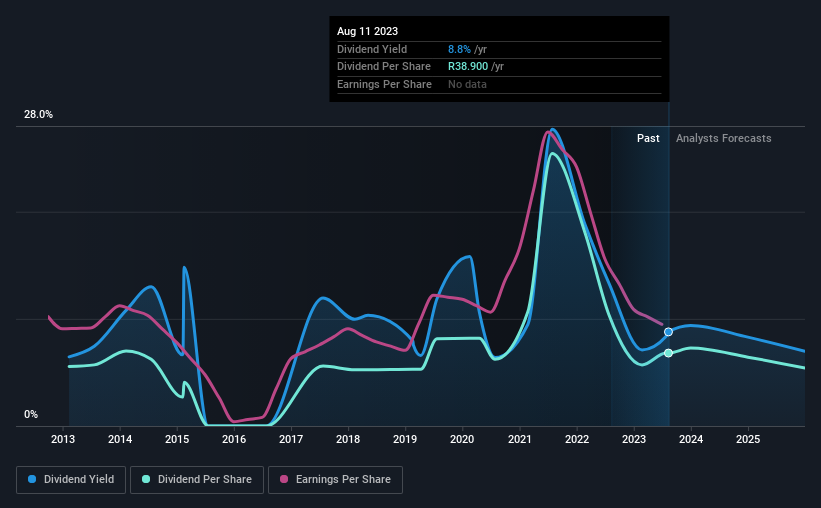Why It Might Not Make Sense To Buy Kumba Iron Ore Limited (JSE:KIO) For Its Upcoming Dividend
Kumba Iron Ore Limited (JSE:KIO) is about to trade ex-dividend in the next three days. Typically, the ex-dividend date is one business day before the record date which is the date on which a company determines the shareholders eligible to receive a dividend. The ex-dividend date is an important date to be aware of as any purchase of the stock made on or after this date might mean a late settlement that doesn't show on the record date. This means that investors who purchase Kumba Iron Ore's shares on or after the 16th of August will not receive the dividend, which will be paid on the 21st of August.
The company's next dividend payment will be R22.60 per share. Last year, in total, the company distributed R38.90 to shareholders. Calculating the last year's worth of payments shows that Kumba Iron Ore has a trailing yield of 8.8% on the current share price of ZAR442.84. Dividends are an important source of income to many shareholders, but the health of the business is crucial to maintaining those dividends. So we need to check whether the dividend payments are covered, and if earnings are growing.
See our latest analysis for Kumba Iron Ore
Dividends are typically paid from company earnings. If a company pays more in dividends than it earned in profit, then the dividend could be unsustainable. Kumba Iron Ore paid out 96% of its earnings, which is more than we're comfortable with, unless there are mitigating circumstances. Yet cash flows are even more important than profits for assessing a dividend, so we need to see if the company generated enough cash to pay its distribution. Over the last year, it paid out more than three-quarters (90%) of its free cash flow generated, which is fairly high and may be starting to limit reinvestment in the business.
It's good to see that while Kumba Iron Ore's dividends were not well covered by profits, at least they are affordable from a cash perspective. Still, if the company continues paying out such a high percentage of its profits, the dividend could be at risk if business turns sour.
Click here to see the company's payout ratio, plus analyst estimates of its future dividends.
Have Earnings And Dividends Been Growing?
Stocks with flat earnings can still be attractive dividend payers, but it is important to be more conservative with your approach and demand a greater margin for safety when it comes to dividend sustainability. If earnings fall far enough, the company could be forced to cut its dividend. It's not encouraging to see that Kumba Iron Ore's earnings are effectively flat over the past five years. It's better than seeing them drop, certainly, but over the long term, all of the best dividend stocks are able to meaningfully grow their earnings per share.
Many investors will assess a company's dividend performance by evaluating how much the dividend payments have changed over time. Kumba Iron Ore has delivered an average of 2.1% per year annual increase in its dividend, based on the past 10 years of dividend payments.
To Sum It Up
Is Kumba Iron Ore an attractive dividend stock, or better left on the shelf? Flat earnings per share and a high payout ratio are not what we like to see, although at least it paid out a lower percentage of its free cash flow. It's not the most attractive proposition from a dividend perspective, and we'd probably give this one a miss for now.
So if you're still interested in Kumba Iron Ore despite it's poor dividend qualities, you should be well informed on some of the risks facing this stock. For example, we've found 1 warning sign for Kumba Iron Ore that we recommend you consider before investing in the business.
If you're in the market for strong dividend payers, we recommend checking our selection of top dividend stocks.
Have feedback on this article? Concerned about the content? Get in touch with us directly. Alternatively, email editorial-team (at) simplywallst.com.
This article by Simply Wall St is general in nature. We provide commentary based on historical data and analyst forecasts only using an unbiased methodology and our articles are not intended to be financial advice. It does not constitute a recommendation to buy or sell any stock, and does not take account of your objectives, or your financial situation. We aim to bring you long-term focused analysis driven by fundamental data. Note that our analysis may not factor in the latest price-sensitive company announcements or qualitative material. Simply Wall St has no position in any stocks mentioned.

